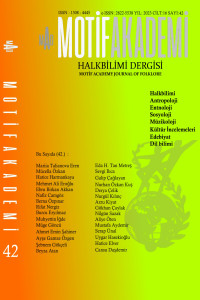HUBÂNNÂME VE ZENANNÂME’DE YER ALAN BİR MİNYATÜRDE İSTANBUL LÂVTASININ İZİNİ SÜRMEK
TRACKING THE ISTANBUL LUTE IN A MINIATURE IN THE HUBÂNNÂME AND ZENANNÂME
Author(s): Gökhan Çaylak, Nilgün SazakSubject(s): Cultural history, Semiotics / Semiology, Music, The Ottoman Empire, History of Art
Published by: Motif Halk Oyunları Eğitim ve Öğretim Vakfı
Keywords: Lute; Istanbul lute; liniature; Turkish music; Turkish musical instruments; semiotics;
Summary/Abstract: There are several lute types used or are still in use in the global history of art. The lute under study is an instrument with which mostly folk songs/tunes were performed between the 18th and the 20th Centuries in a region such as the Western Aegean, especially in Istanbul. Miniatures are the first prominent data sources on the culture and art setting in the Ottoman period which provide information to authors and interested parties on many subjects. In this study, a miniature determined by the author, in the work titled “Hubânnâme ve Zenannâme” authored by Enderunlu Fâzıl, dated 1793, will be discussed as a visual material. In the study, semiotic analysis, a qualitative research method will be conducted based on the theoretical framework of Ferdinand de Sassure (1857-1913). This miniature is the first known miniature in which the Istanbul lute and the Istanbul kamancheh were depicted together. In the study, purpose is to examine the visual elements in the miniature in the context of the Istanbul lute. Considering retrospective inferences and possibilities are emphasized due to the scarcity of resources on the instrument, this miniature appears as a significant value providing information on the setting/space where the instrument was played in the 18th century. It is considered that adopting an interdisciplinary perspective in this study would contribute to further studies
Journal: Motif Akademi Halkbilimi Dergisi
- Issue Year: 16/2023
- Issue No: 42
- Page Range: 745-756
- Page Count: 12
- Language: Turkish

